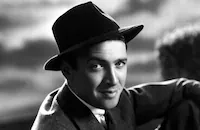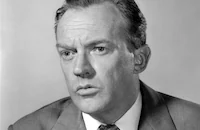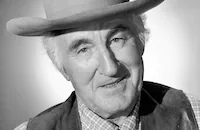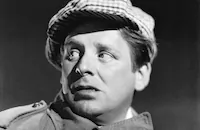The Man from Laramie

Brief Synopsis
Cast & Crew
Anthony Mann
James Stewart
Arthur Kennedy
Donald Crisp
Cathy O'donnell
Alex Nicol
Film Details
Technical Specs

Synopsis
Cavalry captain Will Lockhart poses as a wagon train driver bringing supplies from Laramie to the small town of Coronado in order to investigate an attack by rifle-toting Indians on an Army patrol, which claimed his brother's life. In Coronado, Will is disconcerted to find a repeating rifle at Barbara Waggoman's mercantile store and learns that it was part of a trade with an Apache. The following day, as Will and his men load up their wagons with salt, they are attacked by Barbara's cousin, Dave Waggoman, who accuses Will of stealing and orders his men to rope and drag Will, then set fire to the wagons and shoot the mules. Vic Hansbro, foreman of the Waggoman Barb Ranch, arrives and orders Dave away. Will pays off his men, but old Charley O'Leary offers to stay behind, suggesting that, as his mother was an Apache, he could question the local Indians about rifles. Will returns to Barbara's store and she explains that her uncle Alec owns the town and she despises him for ruining her recently deceased father. Later, Will confronts Dave in town and when Vic attempts to break up the brawl, he and Will fight. Rancher Kate Canaday stops Dave from interfering, and the fight is halted only by the arrival of Alec, who demands that Will leave Coronado. Kate, who was once engaged to Alec, invites Will to her ranch, the Half Moon, and Will accepts, despite advice from town drunk Chris Boldt. Back in town, Barbara chastises Vic, her fiancé, for appeasing Alec, but Vic insists he is invaluable to the Barb. Meanwhile, at the Half Moon, Kate offers Will a job as her foreman, but he declines, explaining that he is only in town seeking his brother's killer. At Alec's invitation, Will goes to the Barb, where Alec gives him restitution money, but refuses to explain why he never took action about the cavalry massacre, which occurred on his land. Later, outside of town, Will meets Charley, who discloses that the Apaches are expecting a shipment of rifles. When Will and Charley realize they have been followed, Charley heads to town and Will discovers Boldt, who offers to sell him information. Later that evening, Will is attacked by Boldt, but after Will knocks him down, Boldt flees. Will then stops by a church celebration and learns from the priest that rifles were used by the Indians during the attack on the cavalry. On his way back to his room, Will is arrested by Sheriff Tom Quigby and accused of murdering Boldt, who was found dead shortly after his confrontation with Will. The next day, Alec visits Will in jail and offers to arrange for a lawyer and a friendly judge, if Will agrees to leave town. When Will asks Alec why he is determined to get him out of town, Alec confesses that he is plagued by a dream in which a stranger kills Dave. Will dismisses Alec's dream and refuses his help. Kate then bails Will out and insists he become the Half Moon foreman. Meanwhile, at the Barb, Alec lectures Dave about his disinterest in the business side of the ranch, but Dave demands that Alec fire Vic so that he can take charge. Vic rides in with the news that Kate has hired Will and that the men suspect Will is a hired gun. Later in private, Alec confesses to Vic that he has lost most of his eyesight and pleads with Vic to protect Dave, assuring him a portion of the Barb at his death, a promise overheard by Dave. When Dave and his men run into Will herding Kate's cattle, Dave fires at him, but is wounded in the hand. Dave orders his men to capture Will and shoots him in the hand as revenge. Dave then heads into the mountains, where he uncovers a wagonload of rifles and sends smoke signals to the Indians, which attract Vic, with whom he has been selling arms to the Indians in hopes of creating instability in the region. Dave insists that they should give the Indians the rifles immediately so that they will attack the Half Moon, but Vic explains that the Barb will also be attacked. After complaining about his lack of authority, Dave draws on Vic, who shoots him dead. Vic brings Dave's body back to the Barb, while Kate and Barbara tend to Will at the Half Moon. The following day after Dave's funeral, Alec rides out alone to the Half Moon to shoot Will, but cannot see well enough to aim. A few days later, Alec questions Vic about the excessive cost of equipment, and when Vic blames Dave, Alec accuses him of purchasing rifles illegally. Despite Vic's attempts to dissuade him, Alec insists on searching for the rifles. Meanwhile, Will meets Charley, who shows him deep rutted wagon tracks, which the men then follow. Vic accompanies Alec into the hills and admits buying the rifles, but insists that it was Dave's idea. When Vic maintains that he has been more of a son to Alec than Dave, Alec is angered, and in the ensuing tussle, Vic pushes Alec down a steep ravine. Will later finds Alec unconscious and takes him to the Half Moon. The doctor reports that Alec is now completely blind, but will recover. Vic arrives at the Barb near dawn, believing Alec dead, and when told otherwise, grows anxious. When Alec regains consciousness he asks for Will and reveals his discovery of the rifles and that Vic is the man in his dreams. Will goes in search of Vic and finds him with the rifle wagon, signaling the Apaches. The men fight and Will forces Vic to push the wagon over a cliff before the Indians' arrival. Vic then escapes, but is killed by the outraged Apaches. Later, Alec and Kate make wedding plans, while Will prepares to depart after telling Barbara he hopes to see her when she returns East.

Director

Anthony Mann
Cast

James Stewart

Arthur Kennedy

Donald Crisp

Cathy O'donnell

Alex Nicol

Aline Macmahon

Wallace Ford
Jack Elam
John War Eagle

James Millican

Gregg Barton
Boyd Stockman

Frank Dekova
Frank Cordell
Jack Carry
William Catching
Frosty Royse
Eddy Waller
Kay Koury
Crew
Frank Burt
Clay Campbell
George Cooper
James Crowe
George Duning
William Goetz
William Holland
Helen Hunt
Henri Jaffa
Charles Lang
Lester Lee
John Livadary
William Lyon
Arthur Morton
Cary Odell
Morris Stoloff
Ned Washington
Philip Yordan

Videos
Movie Clip




Hosted Intro



Film Details
Technical Specs

Articles
The Man from Laramie on Blu-ray
Into this beautiful but isolated land rides Will Lockhart (Stewart) and the wagon train of his freight company. He also has personal business in the territory and it has something to do with the charred remains of a wagon train they pass along the way. Stewart eases up on the neurotic edge he brought to earlier Mann films Winchester 73 and The Naked Spur and is even quite charming when he first arrives in town and meets Barbara (Cathy Downs) with his wagonloads of freight. When she offers him tea, he smiles at the thought of so civilized a break from the trail and watches her bustle about with an appreciation for the feminine presence in his life, no matter how fleeting. But he's a hard, driven man as the dark expression that passes over his face at the massacre graveyard communicates. "It reminds me of what I came here to do," he tells his scout, Charlie, played by Wallace Ford with an easy-going commitment and loyalty. "I'm a lonely man, Mr. Lockhart; so are you," Charlie tells Will as he pays off the crew. "I don't suppose we spoke ten words coming down here, but I feel that I know you and I like what I know."
It's not the Apaches who declare war on Will but Dave Waggoman (Alex Nicol), the sadistic man-child son of cattle baron Alec Waggoman (Donald Crisp) who all but runs the territory. In their first collision, Dave rides up with a veritable posse and has Will roped like livestock and dragged through a campfire. Vic (Arthur Kennedy), the ranch foreman, rides in too late to stop Dave from laying waste to Will's wagons but does interrupt the violence momentarily. Then he advises Will to keep on riding out of town. "This is the most unfriendly country I've ever been in," remarks Will with wry understatement after yet another local warns him to leave. Before the film is over, the violence escalates, becoming more brutal and personal.
Anthony Mann died before he was able to mount his dream project, an epic reworking of King Lear set on the frontier, but takes a dry run at it with The Man From Laramie, which recasts the aging king as despotic cattleman Alec Waggoman and substitutes sons for Lear's daughters: the spoiled bully of a man-child Dave, played by Alec Nicol as a juvenile gang leader in chaps, and Vic, the ranch foreman who is no blood relation but is as loyal and devoted as a son, which only makes Dave jealous and angry and act out with his fists and his guns. Will is the only man in the territory who refuses to kowtow to the overgrown kid and that's good enough to land a job as foreman to an independent rancher (Aline MacMahon) trying to hold off the Waggomans from swallowing them up or pushing them out.
Mann sets much of the film in the gently shadowy atmosphere of late evening and early dawn. You can see that he shot it day-for-night style, stopping down the aperture to cut down the light and darken the image--the shadows are clearly thrown by an afternoon or mid-morning sun--but the effect is lovely, the actors enveloped in the easy shadow of twilight against the deep blue sky. It suggests a peacefulness that is burned away in the hard light of day, which brings out the brutality of volatile figures. He also tends to longer takes and more full shots, which was common to the early CinemaScope movies, when filmmakers worried that editing would be more disorienting in the larger format. It gives the film a calmer surface than previous Mann films. A few jolts of violence aside, there's more tension than action as Mann bottles up the conflicts until they are primed to blow. Will is volatile element added to a system under pressure and Mann's measured rhythms help sustain the building tension and set off the violence with greater contrast. He consistently brought a perverse edge to the violence of his films, reminding us that killing is not a clean, simple act and matching the viciousness of the motivation with the cruelty of the act. Perhaps the most famous and easily the most memorable and visceral moment in The Man From Laramie is a gunshot to the hand, an act of pure sadism. Mann never lets us forget what's happening even as he moves the camera from the hand to a screen-filling close-up of Stewart's face in a slow, sustained take. He grimaces and contorts in pain but never cries out. It's as violent as anything in the films of Peckinpah, made all the more effective by remaining just off screen, close enough for the audience to feel.
This style also allows Mann to show us the physicality of men at work on the frontier, rounding up and branding cattle, riding easily but purposefully along ridge trails, climbing high mountain trails on horseback with the sureness of a veteran forntiersman. That kind of texture is common to westerns but is usually isolated to brief shots establishing a scene. Mann keeps the camera on the action instead of cutting into close-up, which adds to the sense of character and setting. One thing you can say about the Hollywood westerns of the forties and fifties is that the actors knew how to ride. Mann made sure his performers looked like they were born in the saddle.
Twilight Time presents the Blu-ray debut of The Man From Laramie in a beautiful 4K transfer mastered from the original negative and presented in the extra-wide 2.55:1 CinemaScope format. The image is crisp and clear and flawless and the colors are rich and vivid. The contrast between the bright daylight scenes and the early morning / falling evening scenes is especially noticeable thanks to the depth of color in this edition.
Supplements are limited to the original teaser and trailer and Twilight Time's trademark isolated musical score (which includes the effects track), plus an eight-page booklet with stills and an essay by Julie Kirgo. Limited to 3000 copies, available exclusively from Screen Archives and TCM.
by Sean Axmaker

The Man from Laramie on Blu-ray
The Man From Laramie
At first blush, it seems odd that a director who made his early reputation with hard-boiled film noir thrillers would wind up regarded as a grand master of the American Western. In truth, Mann actually brought the same sort of foreboding sensibility from his previous works to the sagebrush story; whereas Ford stressed the opulence of the open West, Mann's prairies were harsh and unforgiving. Stewart knew that he wanted Mann for Winchester '73 (1950) after seeing how the director handled the genre in Devil's Doorway (1950) and The Furies (1950), and Winchester '73 opened a new phase in both men's careers.
It's been reported that Mann had long wished to direct a Western-dress version of King Lear, and the viewer can see similar themes touched upon in The Man From Laramie. As in his other Mann Westerns, Stewart is a man fixated on a mission, an AWOL army officer whose brother died in an armed Apache raid. His quest for the gunrunners that supplied the weapons brings him to a New Mexico town that lives under the effective rule of an aging cattle baron (Donald Crisp).
It doesn't take Stewart long to run afoul of Crisp's psychotic son (Alex Nicol), as well as his more level-headed ranch boss (Arthur Kennedy), who is devoted to the old man and believes that he has earned a share of Nicol's birthright on merit. Both have an agenda in making sure that Stewart never uncovers the source of the rifles, and the increasingly infirm Crisp's declaration that the family spread will belong to Nicol sends the various factions into final, fatal conflict.
Mann's depiction of the depths of the Nicol character's sadistic streak remains as disquieting today as it must have been for audiences of nearly fifty years past. For the early scene where Nicol has his mounted minions rope Stewart and drag him through an open campfire, the star was adamant about performing the stunt himself, despite a nervous Mann's concern over the real possibility of serious injury. As Roy Pickard recalled Stewart's protestations in Jimmy Stewart: A Life In Film (St. Martins Press), "You know it'll look better if I do it, Tony...It's a short scene. And you'll be able to use close-ups. I'm not going to die." Mann shrugged, and the grueling sequence was completed in one ninety-second take.
Stewart and Mann's partnering reflects a rapport and respect that quickly developed during their initial effort, Winchester '73. As quoted in Pickard's work, the director found that the performer "didn't seem to realize what a great quality he had in westerns, not at first anyway. But it was obvious from my side of the camera. He was magnificent walking down a street with a Winchester rifle cradled in his arm. And he was great too when actually firing the gun."
In light of the deepening appreciation that film fans have developed over the years for the Stewart/Mann films, it's a profound shame that the two men came to such an early parting of the ways. Stewart had tried to sell Mann on taking the helm of Night Passage (1957); Mann considered and ultimately demurred, opting instead to devote his energies to The Tin Star (1957). Stewart was hurt by the snub, and The Man From Laramie stands as the last roundup for a storied Hollywood tandem.
Producer: William Goetz
Director: Anthony Mann
Screenplay: Philip Yordan, Frank Burt
Cinematography: Charles B. Lang
Editing: William Lyon
Music: George Duning
Cast: James Stewart (Will Lockhart), Arthur Kennedy (Vic Hansbro), Donald Crisp (Alec Waggoman), Cathy O'Donnell (Barbara Waggoman), Alex Nicol (Dave Waggoman).
C-103m. Letterboxed.
by Jay Steinberg
The Man From Laramie
Quotes
Well, you strike me as a man that's looking for something and willing to pay for it.- Chris Boldt
Well, that depends upon what the information is and who's selling it.- Will Lockhart
Well, I ain't got no references. But anybody can tell you that Chris Boldt is a man not to be trusted. That means nobody's secrets are sacred with me.- Chris Boldt
Uh, huh. And just who were you figuring on selling out?- Will Lockhart
You just name 'em!- Chris Boldt
It wouldn't be *me*, would it?- Will Lockhart
You're just a hard, scheming old woman, aren't you?- Will Lockhart
Ugly, too.- Kate Canady
It's your neck, Lockhart. If you want a Christian funeral, you'd better leave some money with the undertaker.- Sheriff Tom Quigby
They're grazing on Barb land, aren't they?- Dave Waggoman
So they're eating a mouthful of grass! We got plenty growing around here.- Vic Hansbro
Alec always says: a steer swallows a mouthful of Barb grass, it becomes a Barb steer.- Dave Waggoman
Trivia
Notes
The following written prologue appears in the onscreen credits: "We wish to express our appreciation for the co-operation of the people of the State of New Mexico, where this picture was filmed." Thomas Flynn's story The Man From Laramie was serialized in Saturday Evening Post (2 January-20 February 1954). The Man from Laramie was William Goetz's first release for Columbia.

Miscellaneous Notes
Released in United States June 1989
Released in United States on Video April 28, 1988
Released in United States Summer August 1955
Shown at Film Forum in New York City June 6 & 7, 1989.
CinemaScope
Released in United States on Video April 28, 1988
Released in United States June 1989 (Shown at Film Forum in New York City June 6 & 7, 1989.)
Released in United States Summer August 1955













